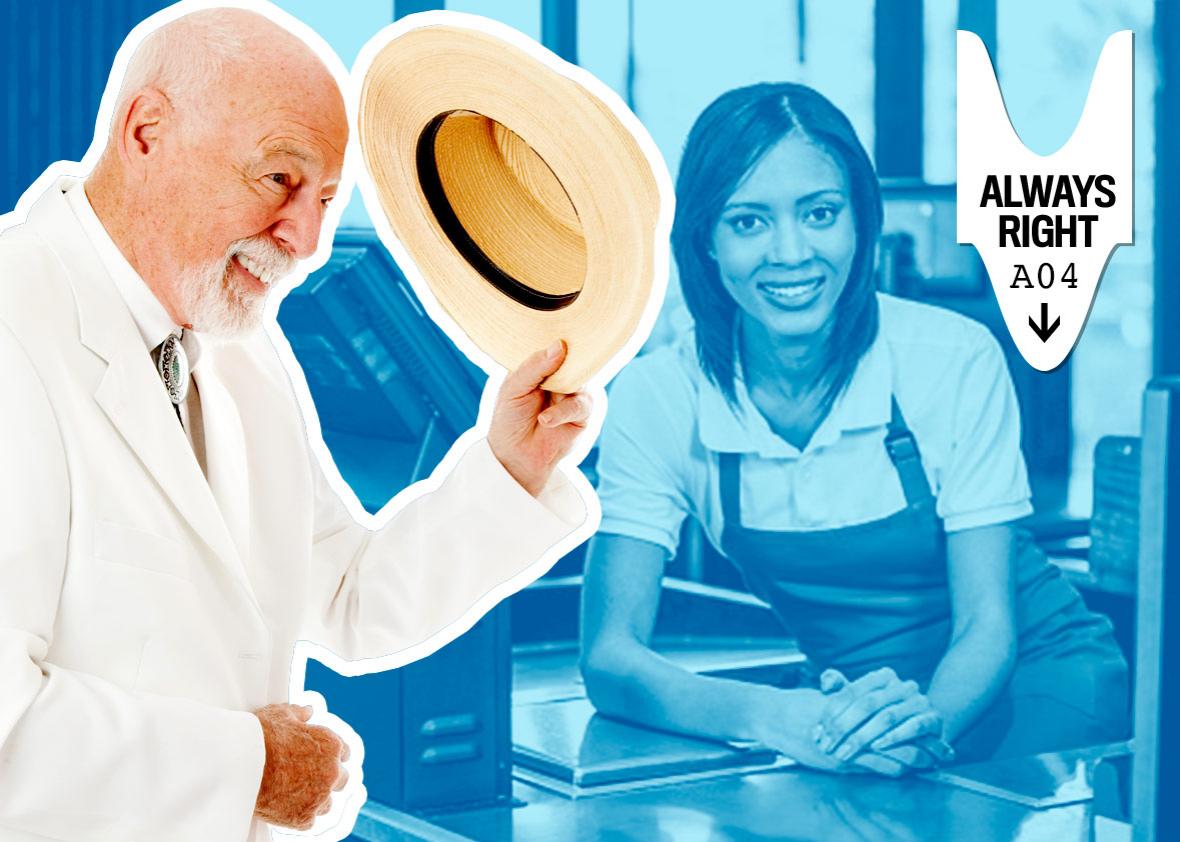For the first four years of my adult life, I worked every weekend as a cashier in my local supermarket. By local, I mean nearby—this was no small-town convenience store. It was one of the busiest outlets of a major supermarket chain in the largest mall in the country, with more than a dozen registers siphoning shoppers out of the store. Despite the store’s size, I, like most cashiers, had my “regulars.” There was the little girl I knew by name who did the weekly family shop with her dad and insisted on seeking out my register, regardless of how long the line might be. There was the man in the tie-dye shirt with tight gray curls, whose name I did not know but whom I mentally referred to as “Old Tom” for his resemblance to a friend of mine (give or take 30 years).
Then there was Bill. Bill (whose name, along with other names, I’ve changed) was a white-haired gentleman, probably in his 80s, whom I never saw without his black beret. He might make a couple of purchases over the course of the weekend, and each one was a small social engagement. A visit. He always came through my register, making courteous conversation. If I had taken off the previous Sunday, he’d ask what I’d been up to. Over the years, Bill brought me chocolates and Christmas cards, and we even once went out for lunch on my break. After I ensured my co-workers knew where I was going, I accompanied Bill to a large café on the other side of the mall, and while I ate a panini (which he insisted on paying for), he told me stories and showed me his sketchbooks.
Bill and I had no reason to ever meet and get to know one another other than through customer service. We never had one another’s telephone number or email address. But the friendly face-to-face interaction we shared week-in week-out created something—perhaps not a friendship but a meaningful relationship nonetheless, an edge case among the kinds of serendipitous encounters customer service can foster. His visits made my day go by a bit more easily. And my conversation, I think, helped Bill avoid feeling lonely.
Over the four years I worked there, the supermarket became more and more focused on providing an automated shopping experience. The ratio of self-checkout to cashiers continued to shift in favor of the independent style, with space afforded to machines slowly eating into the line of registers. Often I’d find myself assigned to the self-checkout, where my only customer interactions consisted of telling customers they’d miscoded mushrooms as potatoes.
A 2016 RBR report forecasts that the global self-checkout market will grow by 44 percent by 2021. Whether buying chicken nuggets or condoms, businesses increasingly allow customers to skip the interaction and serve themselves. Earlier this year, Amazon opened a completely cashier-free store near its company headquarters in Seattle. The futuristic Amazon Go store tracks customers by cameras and sensors throughout the store and automatically charges them for their items as they exit. With Amazon now taking over Whole Foods, moving closer to its goal of becoming central to both online and offline retail, it’s likely the tech company will be bringing its interaction-free style of shopping into even more Americans lives. Meanwhile, 23 percent of American households completed at least a portion of their grocery shopping online last year, with that number expected to rise to 70 percent within a decade. We want things quickly and we want to deal with as few people as possible.
Loneliness, meanwhile, is on the rise, with twice as many adults describing themselves as lonely than did in the 1980s. Though we are more connected than ever before, it is quite possible to go a whole day without uttering a single word. Objective isolation—a lack of day-to-day human contact—has a strong effect on human mortality, according to John T. Cacioppo of the University of Chicago, who studies the negative health effects of loneliness. “Objective contacts and weak ties are good for health,” says Cacioppo. “Not so much for mental health but for physical health.” Objective isolation increases the odds of mortality by 26 percent, says Cacioppo. While no replacement for family and friends, regular interaction makes you more likely to engage in healthy behavior, like leaving the house to visit the pharmacist you like, and increases the social ties—like that pharmacist checking in on you—that improve well-being.
As casually social activities like grocery shopping become “smarter,” more automated and less personal, as the competitive prices of online shopping drive old-fashioned shops out of business, what will happen to these serendipitous encounters? And what will happen to those who rely on them? These nameless yet familiar faces—faces that light up with recognition—can create a vital sense of belonging, a sense of identity within a neighborhood or a city or even a shopping complex. These little encounters add up to a community.
I don’t know what happened to Bill after I left my part-time job: Our weak ties dissolved as soon as I handed in my badge. But I believe he made new ones. (In fact, I don’t doubt Bill had favorites in every shop he visited regularly.) Here in New York, where I moved one year ago not knowing a soul, the person I see most regularly is a smiling stranger, who greets me like a friend from behind the counter of a Brooklyn bodega. I’ll miss him when he’s gone.
